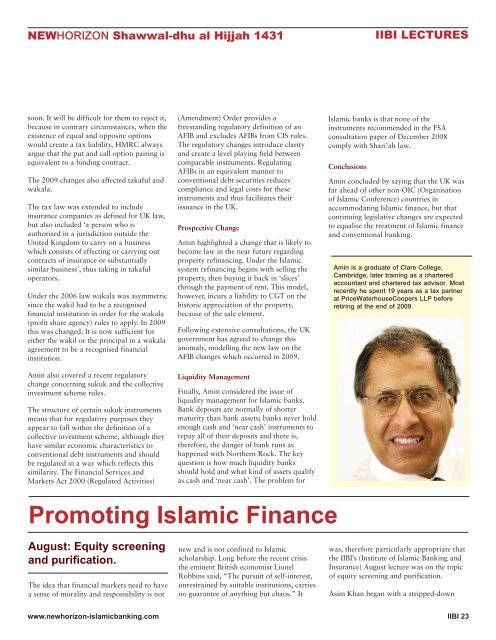NEWHORIZON
NEWHORIZON - Institute of Islamic Banking and Insurance
NEWHORIZON - Institute of Islamic Banking and Insurance
- No tags were found...
Create successful ePaper yourself
Turn your PDF publications into a flip-book with our unique Google optimized e-Paper software.
<strong>NEWHORIZON</strong> Shawwal-dhu al Hijjah 1431<br />
IIBI LECTURES<br />
soon. It will be difficult for them to reject it,<br />
because in contrary circumstances, when the<br />
existence of equal and opposite options<br />
would create a tax liability, HMRC always<br />
argue that the put and call option pairing is<br />
equivalent to a binding contract.<br />
The 2009 changes also affected takaful and<br />
wakala.<br />
The tax law was extended to include<br />
insurance companies as defined for UK law,<br />
but also included ‘a person who is<br />
authorised in a jurisdiction outside the<br />
United Kingdom to carry on a business<br />
which consists of effecting or carrying out<br />
contracts of insurance or substantially<br />
similar business’, thus taking in takaful<br />
operators.<br />
Under the 2006 law wakala was asymmetric<br />
since the wakil had to be a recognised<br />
financial institution in order for the wakala<br />
(profit share agency) rules to apply. In 2009<br />
this was changed. It is now sufficient for<br />
either the wakil or the principal in a wakala<br />
agreement to be a recognised financial<br />
institution.<br />
Amin also covered a recent regulatory<br />
change concerning sukuk and the collective<br />
investment scheme rules.<br />
The structure of certain sukuk instruments<br />
means that for regulatory purposes they<br />
appear to fall within the definition of a<br />
collective investment scheme, although they<br />
have similar economic characteristics to<br />
conventional debt instruments and should<br />
be regulated in a way which reflects this<br />
similarity. The Financial Services and<br />
Markets Act 2000 (Regulated Activities)<br />
(Amendment) Order provides a<br />
freestanding regulatory definition of an<br />
AFIB and excludes AFIBs from CIS rules.<br />
The regulatory changes introduce clarity<br />
and create a level playing field between<br />
comparable instruments. Regulating<br />
AFIBs in an equivalent manner to<br />
conventional debt securities reduces<br />
compliance and legal costs for these<br />
instruments and thus facilitates their<br />
issuance in the UK.<br />
Prospective Change<br />
Amin highlighted a change that is likely to<br />
become law in the near future regarding<br />
property refinancing. Under the Islamic<br />
system refinancing begins with selling the<br />
property, then buying it back in ‘slices’<br />
through the payment of rent. This model,<br />
however, incurs a liability to CGT on the<br />
historic appreciation of the property,<br />
because of the sale element.<br />
Following extensive consultations, the UK<br />
government has agreed to change this<br />
anomaly, modelling the new law on the<br />
AFIB changes which occurred in 2009.<br />
Liquidity Management<br />
Finally, Amin considered the issue of<br />
liquidity management for Islamic banks.<br />
Bank deposits are normally of shorter<br />
maturity than bank assets; banks never hold<br />
enough cash and ‘near cash’ instruments to<br />
repay all of their deposits and there is,<br />
therefore, the danger of bank runs as<br />
happened with Northern Rock. The key<br />
question is how much liquidity banks<br />
should hold and what kind of assets qualify<br />
as cash and ‘near cash’. The problem for<br />
Islamic banks is that none of the<br />
instruments recommended in the FSA<br />
consultation paper of December 2008<br />
comply with Shari’ah law.<br />
Conclusions<br />
Amin concluded by saying that the UK was<br />
far ahead of other non-OIC (Organisation<br />
of Islamic Conference) countries in<br />
accommodating Islamic finance, but that<br />
continuing legislative changes are expected<br />
to equalise the treatment of Islamic finance<br />
and conventional banking.<br />
Amin is a graduate of Clare College,<br />
Cambridge, later training as a chartered<br />
accountant and chartered tax advisor. Most<br />
recently he spent 19 years as a tax partner<br />
at PriceWaterhouseCoopers LLP before<br />
retiring at the end of 2009.<br />
Promoting Islamic Finance<br />
August: Equity screening<br />
and purification.<br />
The idea that financial markets need to have<br />
a sense of morality and responsibility is not<br />
new and is not confined to Islamic<br />
scholarship. Long before the recent crisis<br />
the eminent British economist Lionel<br />
Robbins said, “The pursuit of self-interest,<br />
unrestrained by suitable institutions, carries<br />
no guarantee of anything but chaos.” It<br />
was, therefore particularly appropriate that<br />
the IIBI’s (Institute of Islamic Banking and<br />
Insurance) August lecture was on the topic<br />
of equity screening and purification.<br />
Asim Khan began with a stripped-down<br />
www.newhorizon-islamicbanking.com<br />
IIBI 23
















